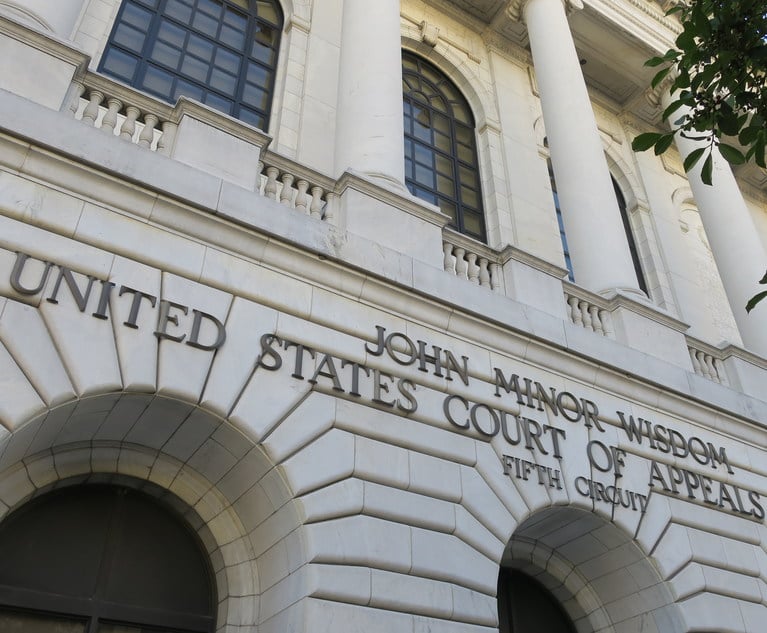Labor Advocates, Citing Trump Uncertainty, Want to Jump Into EEOC Case
Civil rights groups want to intervene in a long-running case in Texas over the U.S. Equal Employment Opportunity Commission's stand on employers citing criminal background checks in hiring decisions, arguing in part that the Trump administration gives them doubt the agencies will "zealously" defend the protections in place.
August 03, 2017 at 02:46 PM
5 minute read
Civil rights groups want to intervene in a long-running case in Texas over the U.S. Equal Employment Opportunity Commission's stand on employers citing criminal background checks in hiring decisions, arguing in part that the Trump administration gives them doubt the agencies will “zealously” defend the protections in place.
The NAACP Legal Defense and Educational Fund Inc., the National Employment Law Project and attorneys from Cloutman & Cloutman and Levy Ratner this week filed a motion to intervene in a case in the U.S. District Court for the Northern District of Texas. The lawsuit, filed by the state of Texas in 2013, challenges EEOC guidance that prohibits discrimination in how employers look at the conviction and arrest records of job applicants.
The groups seeking intervention in Texas v. Equal Employment Opportunity Commission said they fear the EEOC, under new leadership, will abandon the guidance that prevents employers from discrimination against people with criminal records, calling it “reasonable uncertainty” surrounding the views of the new leadership.
The push marks the latest example where parties in a court case express a lack of confidence in the Trump administration and question its commitment to civil rights statutes and policies. The EEOC declined to comment.
“Giving voice to these perspectives is all the more important, given that recent changes in the federal government's litigation and policy positions make it doubtful that the current administration will adequately, let alone zealously, defend the 2012 EEOC guidance,” the advocacy groups said in a statement announcing the motion to intervene.
Beth Avery, a staff attorney for the National Employment Law Project, said the case in Texas has the potential to undo protections.
“You can't ignore the current political environment,” Avery said. “We've seen the administration change its stance on some issues. We don't know what this administration is going to do and we can't leave that to chance.”
Various Trump administration agencies have already shifted perspective in several cases. The U.S. Justice Department, veering from the EEOC's position, said in an amicus brief last week in a closely watched case that sexual orientation should not be protected under federal civil rights laws. The department's rare move put two government agencies on opposing sides of an issue in the same case.
The Texas AFL-CIO filed a request to intervene last year in an unrelated case in Texas federal court, arguing the U.S. Labor Department would not adequately defend the Obama-era regulations that extended overtime pay to millions of more workers. The case is pending in the U.S. Court of Appeals for the Fifth Circuit.
In that case, under the Labor Department's new leadership, the agency has continued to argue for its right to set a salary threshold for overtime pay but did not fight for the actual increase, which doubled to the previous salary. Labor regulators are reviewing the Obama rule.
“We're not saying that the Department of Labor and the Department of Justice haven't forcefully defended the regulations [so far], but as for whether that will continue in the future, we're starting to have serious concerns,” Yona Rozen, an assistant general counsel at the AFL-CIO, said in an interview late last year. Rozen is representing the Texas branch in the case in front of U.S. District Judge Amos Mazzant III in the Eastern District of Texas.
The 2012 guidance at issue in Texas's lawsuit against the EEOC was adopted by the agency with a 4-1 vote, receiving bipartisan support. Victoria Lipnic, now the EEOC acting chair, voted in favor of the guidance. The agency in the coming months is expected to shift to Republican-controlled leadership, likely under the direction of Janet Dhillon, the Burlington Stores Inc. general counsel nominated as chairwoman. Daniel Gade, an Iraq War veteran and West Point public policy assistant professor, was picked this week for an open seat on the commission.
The EEOC case in Texas involves guidance that prohibits employers from discriminating against job applicants or workers who have a criminal record. Texas asked the federal court to deny jobs to applicants based on convictions and requested a court order that the EEOC lacks the authority to issue “right-to-sue” letters.
A motion to intervene would allow the Texas State Conference of the NAACP and 61-year-old Beverly Harrison, a woman who was terminated for a crime she committed when she was 19 years old, to become part of the case. Harrison was hired by Dallas County Schools and fired eight days later after the county discovered her previous conviction.
“I am seeking to be a part of this lawsuit because I am deeply concerned that I, and others like me, may be denied jobs in the future in Texas—if the state has its way through this case—based on similar policies to that of DCS that bar individuals like me with criminal records,” Harrison said. “Such absolute bans are absurd given that my conviction is four decades old and I have demonstrated that I can be a valuable and dependable employee and serve my community in Texas.”
Related Articles:
|- Burlington GC Janet Dhillon, Trump's Pick for EEOC, Discloses Ethics Pledge, Salary
- Trump Administration Lines Up Against EEOC in LGBT Workplace Rights Case
- Trump's Latest EEOC Pick, Daniel Gade, Has Long Criticized Disability Pay for Vets
- 50 Companies Tell Court Sexual Orientation Discrimination Is Bad For Business
- DC Circuit Twice Says Democratic State AGs Can Fight Trump
This content has been archived. It is available through our partners, LexisNexis® and Bloomberg Law.
To view this content, please continue to their sites.
Not a Lexis Subscriber?
Subscribe Now
Not a Bloomberg Law Subscriber?
Subscribe Now
NOT FOR REPRINT
© 2025 ALM Global, LLC, All Rights Reserved. Request academic re-use from www.copyright.com. All other uses, submit a request to [email protected]. For more information visit Asset & Logo Licensing.
You Might Like
View All
Legal Issues to Watch in the US Appeals Courts in 2025

Second Circuit Upholds $5M Judgment Against Trump in E. Jean Carroll Case
4 minute read
Divided 5th Circuit Shoots Down Nasdaq Diversity Rules

Nevada Supreme Court to Decide Fate of Groundbreaking Contingency Cap Ballot Measure
5 minute readTrending Stories
- 1The Appropriate Exemption in Students for Fair Admissions v. President & Fellows of Harvard College
- 2DOJ, 10 State AGs File Amended Antitrust Complaint Against RealPage and Big Landlords
- 3New Partners at Cummings & Lockwood, Carmody Torrance Sandak & Hennessey
- 4'Extra Government'?: NY Top Court Eyes Ethics Commission's Constitutionality
- 5South Texas College of Law Houston Selects New Dean
Who Got The Work
Michael G. Bongiorno, Andrew Scott Dulberg and Elizabeth E. Driscoll from Wilmer Cutler Pickering Hale and Dorr have stepped in to represent Symbotic Inc., an A.I.-enabled technology platform that focuses on increasing supply chain efficiency, and other defendants in a pending shareholder derivative lawsuit. The case, filed Oct. 2 in Massachusetts District Court by the Brown Law Firm on behalf of Stephen Austen, accuses certain officers and directors of misleading investors in regard to Symbotic's potential for margin growth by failing to disclose that the company was not equipped to timely deploy its systems or manage expenses through project delays. The case, assigned to U.S. District Judge Nathaniel M. Gorton, is 1:24-cv-12522, Austen v. Cohen et al.
Who Got The Work
Edmund Polubinski and Marie Killmond of Davis Polk & Wardwell have entered appearances for data platform software development company MongoDB and other defendants in a pending shareholder derivative lawsuit. The action, filed Oct. 7 in New York Southern District Court by the Brown Law Firm, accuses the company's directors and/or officers of falsely expressing confidence in the company’s restructuring of its sales incentive plan and downplaying the severity of decreases in its upfront commitments. The case is 1:24-cv-07594, Roy v. Ittycheria et al.
Who Got The Work
Amy O. Bruchs and Kurt F. Ellison of Michael Best & Friedrich have entered appearances for Epic Systems Corp. in a pending employment discrimination lawsuit. The suit was filed Sept. 7 in Wisconsin Western District Court by Levine Eisberner LLC and Siri & Glimstad on behalf of a project manager who claims that he was wrongfully terminated after applying for a religious exemption to the defendant's COVID-19 vaccine mandate. The case, assigned to U.S. Magistrate Judge Anita Marie Boor, is 3:24-cv-00630, Secker, Nathan v. Epic Systems Corporation.
Who Got The Work
David X. Sullivan, Thomas J. Finn and Gregory A. Hall from McCarter & English have entered appearances for Sunrun Installation Services in a pending civil rights lawsuit. The complaint was filed Sept. 4 in Connecticut District Court by attorney Robert M. Berke on behalf of former employee George Edward Steins, who was arrested and charged with employing an unregistered home improvement salesperson. The complaint alleges that had Sunrun informed the Connecticut Department of Consumer Protection that the plaintiff's employment had ended in 2017 and that he no longer held Sunrun's home improvement contractor license, he would not have been hit with charges, which were dismissed in May 2024. The case, assigned to U.S. District Judge Jeffrey A. Meyer, is 3:24-cv-01423, Steins v. Sunrun, Inc. et al.
Who Got The Work
Greenberg Traurig shareholder Joshua L. Raskin has entered an appearance for boohoo.com UK Ltd. in a pending patent infringement lawsuit. The suit, filed Sept. 3 in Texas Eastern District Court by Rozier Hardt McDonough on behalf of Alto Dynamics, asserts five patents related to an online shopping platform. The case, assigned to U.S. District Judge Rodney Gilstrap, is 2:24-cv-00719, Alto Dynamics, LLC v. boohoo.com UK Limited.
Featured Firms
Law Offices of Gary Martin Hays & Associates, P.C.
(470) 294-1674
Law Offices of Mark E. Salomone
(857) 444-6468
Smith & Hassler
(713) 739-1250










